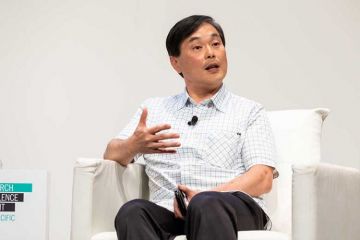“One of my first acts on being born in 1964 was to attend university, since my parents were both students, and I wanted to be close to my mother at the time. I acquired a lifelong knack of sleeping through lectures.”
So wrote the UK’s now prime minister Boris Johnson back in 2006, when he was briefly shadow higher education minister.
Opening a paper titled “Aspire ever higher: university policy for the 21st century” with a gag is typical of the man who now holds the keys to Number 10.
More worrying, given how effective he has proved at aspiring ever higher in his political career, is the casual boast that he was not one to actually bother applying himself to the business of listening and learning.
It is often said that Johnson is a shapeshifting crowd-pleaser rather than a principled leader. The Conservative grandee Michael Heseltine described him recently as “a man who waits to see the way the crowd is running and then dashes in front and says, ‘Follow me’.”
If this assessment is correct, then perhaps it is a fool’s errand to return to that paper of 2006 for clues about his position on higher education in 2019 (in any event, a huge amount has changed in the UK policy environment since then).
But let’s give it a go anyway.
The essay gives the impression of someone highly attuned to the (very familiar) headlines of the day: the “more means less” debate on student numbers; complaints about grade inflation; concerns about funding; and the balance between academic and vocational pathways.
But it also suggests that Johnson was not necessarily on board with every bandwagon, and had some sympathy with the internal concerns of universities. He talks of academic pay that “has dismally failed to keep pace with that of other professionals”, frets about diminishing resources (a major threat if tuition fees were to be cut, as the Augar review recommends), and makes much of the enormous value of universities that are not just open but attractive to global talent.
It is worth noting, too, that in reappointing his brother Jo as universities minister, he has brought back to the brief someone who has been unequivocal in his support for measures to bolster internationalism (including via post-study work rights), and savage in his criticism
of the proposed cut to fees.
Indeed, many of the core issues discussed in the 2006 paper remain relevant to the higher education debate today.
Johnson namechecks Alison Wolf in a passage arguing that “we lack the right technical education” – a key theme of the Augar review panel, of which Wolf was a member.
However, there are also contrasts. “I certainly don’t believe in some mad plan to try to compel a certain proportion of people to stick to vocational courses and thereby reduce university numbers,” he says – a position that contradicts at least some of the Augar panellists, who mooted a DDD minimum tariff threshold for loans.
In other key themes, Johnson’s paper worries about UK universities losing ground in the global prestige stakes to the US (and so, losing academic talent), as they surely will when Brexit hits.
Dismissing quotas and targets for student numbers, he says he is relaxed if this produces plumbers with Classics degrees, because “it’s not about the economy, stupid, it’s about civilization”.
How representative might all this be of Prime Minister Johnson’s stance in 2019?
The view of Bill Rammell, vice-chancellor of the University of Bedfordshire who back in 2006 was the higher education minister who Johnson shadowed, is that for all his failings, and taking Brexit out of the equation, Johnson could prove to be more supportive of higher education than Theresa May.
“I’m not a fan, and I think his stance on Brexit is deeply worrying and will be deeply damaging. What also worries me, having observed him in meetings and across the dispatch box, is that he doesn’t do detail, and I think that as prime minister that will be found out.
“There are some pluses, however. Broadly I think he is more pro higher education than May has been. I certainly think he has a commitment to the internationalisation of higher education and is likely to move international students outside the migration cap. And he was, in my experience, very pro-STEM and certainly spoke up for the sector as a whole.”
If you’re looking for silver linings, that might be your lot.
Register to continue
Why register?
- Registration is free and only takes a moment
- Once registered, you can read 3 articles a month
- Sign up for our newsletter
Subscribe
Or subscribe for unlimited access to:
- Unlimited access to news, views, insights & reviews
- Digital editions
- Digital access to THE’s university and college rankings analysis
Already registered or a current subscriber?









